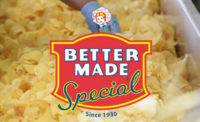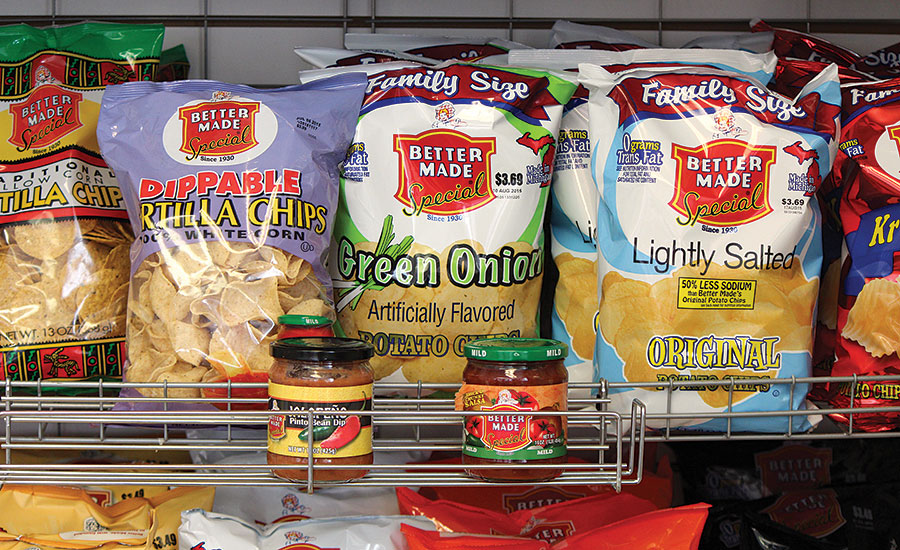Machinery Technology: Form Fill Seal
Better Made is all that and a bag of chips

Better Made chip bags

The multi-head weigher has 14 scales, which are all synced to the machine’s computer, so they know which scales to empty into the bag to make up the required total ounces.

Before weighing and filling, the chips get seasoned in the tumble drum and are constantly moving ensuring proper coating before making their way to the scales.

The potato chips’ film bags are formed and filled at speeds of about 65 bags per minute.




Since 1930, Better Made has been producing high quality potato chips in Michigan, and has been making them in their facility on Gratiot Avenue in Detroit since the 1940s. If you live here in the Great Lakes state, you know just how iconic this brand really is. The facility in Detroit is 150,000 square feet and has seen expansion 19 times since the founders bought the building in the early 1940s. The facility operates 17 hours a day, five days a week, all year long turning locally grown potatoes into a salty snack in about five minutes time.
Our crew showed up on a sunny morning and got to see the whole process, from the potatoes coming into the facility, to the packaged bags being palletized by hand for warehousing and eventual distribution. The potatoes enter the facility and journey through processing to the packaging line where they are portioned out for packaging in sizes ranging from the 1-ounce snack bags to the 20-ounce super size bag.
From processing to packaging & beyond
Mark Winkelman, president of Better Made, says it take about seven minutes for a potato in its raw form to make its way into a packaged bag. The company goes through 60 million pounds of potatoes a year creating the nostalgic Detroit potato chip brand.
The potato making itself was an interesting thing to see, as well as palate pleasing, as we got to sample a chip right out of the fryer. But the packaging line is the impressive part of the journey as the chips make their way from the fryer to the seasoner, and then directly into the filling machine where the chips are portioned out for packaging in any of the packaged sizes.
The VFFS machines from Heat & Control (heatandcontrol.com) include the Ishida multi-head weigher with fourteen scales, which are all synced to the machine’s computer, so they know which scales to empty into the bag to make up the required total ounces. The machine’s accuracy is within 2 grams. There were four of these systems in place running at the time of our tour, filling original and BBQ flavored potato chips accurately and quickly.
Before weighing and filling, the chips get seasoned (when packaging a seasoned variety) in the tumble drum and are constantly moving ensuring proper coating before making their way to the scales. “Good seasoning demands steady flow,” Winkelman tells me as we watch the potato chips tumble around being coated in the orange-colored BBQ flavoring (our crew’s favorite flavor).
The potato chips’ film bags are fed through the machine and a Videojet (videojet.com) printer adds information to the bag, such as sell by date and a code listing the operator, machine and time stamp. The film is then formed and filled, completing the process within a short amount of time, filling about 65 bags per minute.
End of the line isn’t end of the road
The bags are then case packed by hand and placed on a conveyor where the boxes journey through a few checkpoints before making their way into the warehouse. The boxes are scanned first to ensure proper labeling. They are then run through an x-ray and checkweigher from Eagle Product Inspection (eaglepi.com) to detect any foreign objects such as plastic or a bolt from a machine. The machine also checks the weight of the box to ensure that the bags fall within the weight standard for the filled bags.
There is another machine on the premise that groups together six of the 1-ounce bags together to form a multi-pack unit. The Woodman Vantage multi-bag baler, from Kliklok-Woodman (kliklokwoodman.com), groups the six bags in a clear flexible film multi-bag unit for purchase, popular for lunches or easy portion-controlled snacking. Winkelman told me that these bales are one of the top 10 products that Better Made sells.
After inspection, the boxes are palletized by hand and sorted in the warehouse for storage and eventual pick up. Better Made runs 6-8 SKUs per day and packs 10,000 cases per day. In a separate part of the facility, Better Made pops and fills its popcorn snack variety. We got to see some of that process in action and even got to sample the newer low-calorie flavor. Connected to the facility is the Better Made Factory Outlet store where consumers are able to purchase the chips as close to production as possible.
The nostalgic brand currently distributes its potato chips mainly in Michigan, with plans to distribute in bordering areas in the near future. The facility operates partly by machine and partly by hand but no doubt produces quality product with a great attention to detail along the whole processing and packaging line. According to the company’s website, the Detroit brand’s name, Better Made, is not only a brand name but a way of doing business.
To see a video tour of Better Made, go to: packagingstrategies.com/BetterMade.
Looking for a reprint of this article?
From high-res PDFs to custom plaques, order your copy today!










